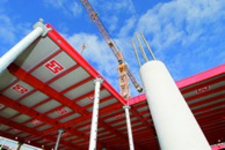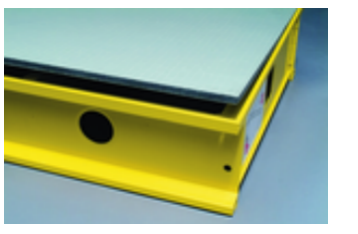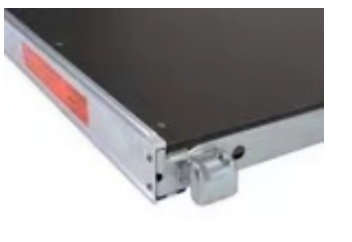
The thermoplastic composite materials developed by Mitsubishi Chemical Advanced Materials are finding increasing use in the construction industry because they are in many respects markedly superior to wood, the classic material. They are above all light, weather-insensitive, dimensionally stable and non-rotting.
Mitsubishi Chemical Advanced Materials has therefore developed MultiQ, a solid thermoplastic composite panel, by resorting to two proven polypropylene-based materials. Used as formwork panels or scaffold planks, they boost economic efficiency on the construction site thanks to their long service life.
The innovative sandwich board has a core made of SymaLITE, while the cover layers consist of high-strength, thin and UV-resistant GMTex. In the production of MultiQ, the two sheet-like semi-finished products are welded together into 9 to 22 mm thick sandwich panels through the application of heat. The surface of the new composite is homogeneous and smooth. The special combination of multi-directional glass fibers in the core and cover layer fibers oriented in the direction of tension and compression yields the desired high material stiffness with a low weight per unit area.
The MultiQ product line is a modular system. The composition and thickness of the fiber composite panels offer plenty of scope for variation and permit design to customer specification. Mitsubishi Chemical Advanced Materials makes it possible to have panels produced in different colors and sizes up to a maximum size of 2.4 x 3.5 m.

Formwork panel
Conventional formwork panels made of plywood swell, discolor, rot and have to be very carefully cleaned so that they achieve the desired quality of concrete surface during their service life of 50 to 80 uses. The fundamental problem is that any moisture penetrating into the wood has a negative effect on the panel's technical and mechanical properties.
Not so the patented MultiQ Concrete formwork panel. It achieves all the mechanical properties expected of formwork panels while being far superior to conventional formply. It is lighter and resistant to moisture, aggressive media and temperature fluctuations. The composite panel doesn't swell or shrink and is UV-resistant and insensitive to knocks and scrapes. What's more, it can be worked in the same way as plywood, i.e. it can be nailed, sawn and drilled without splintering, although it offers much easier and faster handling during stripping as well as during cleaning and repair. Thanks to their absolutely smooth plastic surface, the panels can be released effortlessly from the concrete even if little release agent is used, while also being very easy to clean. Damaged areas can be very simply and almost invisibly repaired with identical material. The outcome is less wear and almost invariably high-quality concrete surfaces throughout the plastic formwork panel's entire service life (over 250 uses). This has also been confirmed by a leading supplier of formwork systems who has had MultiQ Concrete in service for several years now.

Scaffold board
Incredibly impact-resistant
MultiQ Impact is another sandwich panel variant, developed by Mitsubishi Chemical Advanced Materials as a board for construction scaffolds and other walkways requiring high standards of impact resistance and non-slip surface. The scaffold boards factory-finished with an integrated non-slip surface are already being put to standard use in the scaffold systems of a well-known manufacturer. Like the panel used as formwork, the plastic scaffold board scores with its durability, moisture resistance, UV-resistance, low weight and ease of cleaning.
However, when used as a walkway and work deck, another technical feature of the composite material comes into play, i.e. its incredible impact resistance. The dynamic penetration test described in ISO 6603-2, in which penetration behavior is tested in an instrument-monitored impact test, shows that a 10 mm MultiQ® board with a weight per unit area of just 7 kg/m² absorbs more energy than a 14 mm thick plywood panel (area weight 10-13 kg/m²). This is a property that doesn’t change even after many uses, whereas wooden planks lose their initial load-bearing capacity as a result of damage and the associated moisture absorption. The successfully accomplished dynamic penetration tests, prescribed for the approval of safe scaffold boards, confirm the technical characteristics of the innovative scaffold board made of glass-reinforced plastic. It is also suitable for use in safety and protective scaffolds.